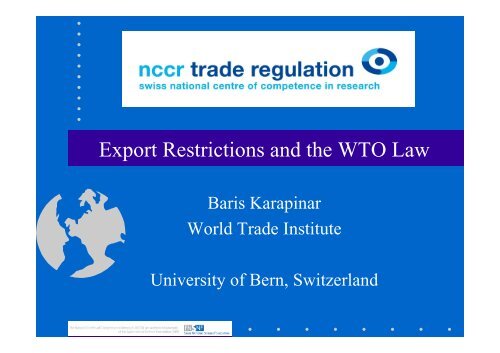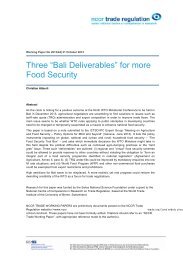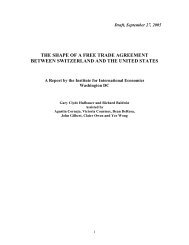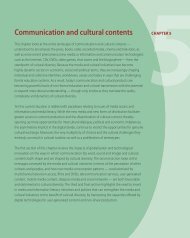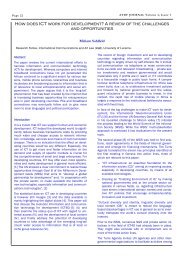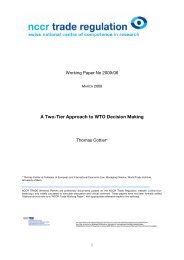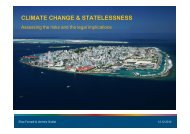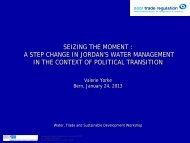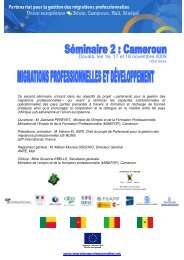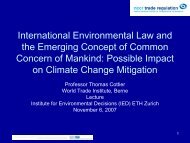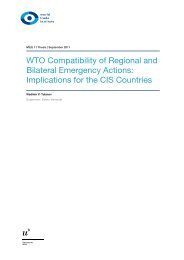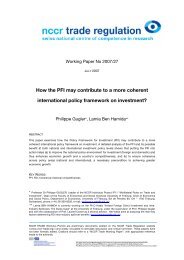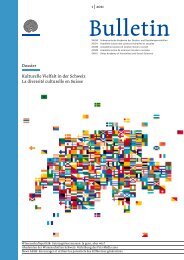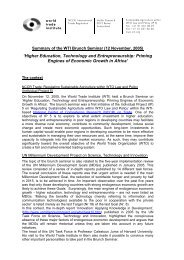Presentation slides, PDF - World Trade Institute
Presentation slides, PDF - World Trade Institute
Presentation slides, PDF - World Trade Institute
Create successful ePaper yourself
Turn your PDF publications into a flip-book with our unique Google optimized e-Paper software.
Export Restrictions and the WTO Law<br />
Baris Karapinar<br />
<strong>World</strong> <strong>Trade</strong> <strong>Institute</strong><br />
University of Bern, Switzerland
NCCR<br />
International<br />
<strong>Trade</strong><br />
<strong>World</strong> <strong>Trade</strong> <strong>Institute</strong><br />
Joint Center of the Universities of<br />
Berne, Fribourg and Neuchâtel<br />
Hallerstrasse 6<br />
3012 Berne, Switzerland<br />
www.nccr-trade.org<br />
www.wti.org<br />
Tel. +41 31 631 30 80<br />
Fax +41 31 631 36 30<br />
nccr@wti.org<br />
Export restrictions in headlines<br />
• China’s restrictions of the exports of rare earth metals to<br />
Japan<br />
• Russia’s restrictions on wheat in August 2010<br />
• ‘Food crisis’ of 2007–2008 - dozens of countries imposed<br />
export restrictions<br />
• WTO Dispute Settlement, December 2009, United States<br />
(US), the European Union (EU) and Mexico vs China<br />
Export restrictions on selected raw materials
NCCR<br />
International<br />
<strong>Trade</strong><br />
<strong>World</strong> <strong>Trade</strong> <strong>Institute</strong><br />
Joint Center of the Universities of<br />
Berne, Fribourg and Neuchâtel<br />
Hallerstrasse 6<br />
3012 Berne, Switzerland<br />
www.nccr-trade.org<br />
www.wti.org<br />
Tel. +41 31 631 30 80<br />
Fax +41 31 631 36 30<br />
nccr@wti.org<br />
Outline<br />
• Economic, political, legal and environmental dimensions<br />
of export restrictions<br />
• Why do countries resort to export restrictions, potential<br />
implications for domestic and global welfare<br />
• WTO regulation<br />
• GATT/WTO cases and the ‘China- Raw Materials’ case<br />
• Environmental protection vs. disguised restriction on trade<br />
• Do we need stricter WTO regulation<br />
• WTO reform agenda
NCCR<br />
International<br />
<strong>Trade</strong><br />
<strong>World</strong> <strong>Trade</strong> <strong>Institute</strong><br />
Joint Center of the Universities of<br />
Berne, Fribourg and Neuchâtel<br />
Hallerstrasse 6<br />
3012 Berne, Switzerland<br />
www.nccr-trade.org<br />
www.wti.org<br />
Tel. +41 31 631 30 80<br />
Fax +41 31 631 36 30<br />
nccr@wti.org<br />
Policy Objectives<br />
• To maintain domestic food supplies<br />
• To promote downstream processors and manufacturers<br />
• Important source of government revenue (10 per cent of<br />
government revenue in Côte d’Ivoire)<br />
• Part of a fiscal regime (export taxes): flexibilities<br />
• Environmental protection (exhaustible natural resources<br />
including water, fisheries, forestry and minerals)<br />
• Prevent or slow down the depletion of natural resources,<br />
keep them for the benefit of future generations<br />
• High energy intensity of the production/processing of raw<br />
materials: cut emissions, promote energy efficiency
NCCR<br />
International<br />
<strong>Trade</strong><br />
<strong>World</strong> <strong>Trade</strong> <strong>Institute</strong><br />
Joint Center of the Universities of<br />
Berne, Fribourg and Neuchâtel<br />
Hallerstrasse 6<br />
3012 Berne, Switzerland<br />
www.nccr-trade.org<br />
www.wti.org<br />
Tel. +41 31 631 30 80<br />
Fax +41 31 631 36 30<br />
nccr@wti.org<br />
Welfare implications<br />
• Export restrictions result in welfare losses at the national<br />
and global levels<br />
• Potential impacts vary depending on the demand and<br />
supply elasticity of the commodity<br />
• Domestic consumers of the restricted product would<br />
benefit from lower than pre-export restriction prices (yet<br />
deadweight cost of market distortion)<br />
• At the global level, in the short run, supply restrictions<br />
push up the prices of the restricted commodity, consumer<br />
welfare will decrease while producer welfare will increase<br />
• Export restrictions unilaterally applied by one country may<br />
also lead to some trade diversion
NCCR<br />
International<br />
<strong>Trade</strong><br />
<strong>World</strong> <strong>Trade</strong> <strong>Institute</strong><br />
Joint Center of the Universities of<br />
Berne, Fribourg and Neuchâtel<br />
Hallerstrasse 6<br />
3012 Berne, Switzerland<br />
www.nccr-trade.org<br />
www.wti.org<br />
Tel. +41 31 631 30 80<br />
Fax +41 31 631 36 30<br />
nccr@wti.org<br />
Beyond pure economics<br />
• Export restrictions may help internalise some negative<br />
environmental externalities<br />
• Markets for environmental goods and services are not fully<br />
developed (market imperfections)<br />
• To what extent such policy interventions justify the<br />
welfare losses is a question of the social value of<br />
environmental goods<br />
• The effectiveness of the intervention: there could be<br />
significant discrepancies between the intended policy<br />
objectives and the actual impact on the ground<br />
• Alternative policy tools could be employed and be equally<br />
as effective or more so than export restrictions (and<br />
potentially less costly in terms of welfare losses)
NCCR<br />
International<br />
<strong>Trade</strong><br />
<strong>World</strong> <strong>Trade</strong> <strong>Institute</strong><br />
Joint Center of the Universities of<br />
Berne, Fribourg and Neuchâtel<br />
Hallerstrasse 6<br />
3012 Berne, Switzerland<br />
www.nccr-trade.org<br />
www.wti.org<br />
Tel. +41 31 631 30 80<br />
Fax +41 31 631 36 30<br />
nccr@wti.org<br />
Alternative tools<br />
(instead of or in conjunction with export restrictions)<br />
• Strong regulatory mechanism imposing strict standards of<br />
production and pollution control<br />
• Pollution charges directly applied to producers based on<br />
the amount of physical/chemical pollutants they discharge<br />
• Promoting and subsidising clean and efficient technologies<br />
• Liability insurance mechanisms covering potential<br />
environmental damage
NCCR<br />
International<br />
<strong>Trade</strong><br />
<strong>World</strong> <strong>Trade</strong> <strong>Institute</strong><br />
Joint Center of the Universities of<br />
Berne, Fribourg and Neuchâtel<br />
Hallerstrasse 6<br />
3012 Berne, Switzerland<br />
www.nccr-trade.org<br />
www.wti.org<br />
Tel. +41 31 631 30 80<br />
Fax +41 31 631 36 30<br />
nccr@wti.org<br />
WTO Regulation<br />
• WTO regulation is limited, offers ample ‘policy space’<br />
• GATT XI requires Members to eliminate all prohibitions<br />
and quantitative restrictions on exports<br />
• Exceptions: ‘temporarily’ to prevent food shortages; to<br />
allow time for the application of regulations such as<br />
classification and grading<br />
• Environmental protection, under Article XX.<br />
• Article 12 of the AoA mirrors GATT XI, requires<br />
Members to give a written notice to the Committee on<br />
Agriculture, and to consult with potentially affected<br />
Members<br />
• GATT XI does not restrict Members to imposing duties,<br />
taxes or other charges on exports (Members are allowed to<br />
impose export taxes)
NCCR<br />
International<br />
<strong>Trade</strong><br />
<strong>World</strong> <strong>Trade</strong> <strong>Institute</strong><br />
Joint Center of the Universities of<br />
Berne, Fribourg and Neuchâtel<br />
Hallerstrasse 6<br />
3012 Berne, Switzerland<br />
www.nccr-trade.org<br />
www.wti.org<br />
Tel. +41 31 631 30 80<br />
Fax +41 31 631 36 30<br />
nccr@wti.org<br />
WTO-plus<br />
• New WTO Members, such as China, Mongolia, Saudi<br />
Arabia, and Ukraine, were required to commit to stricter<br />
rules<br />
• They were obliged to phase out export taxes or to limit<br />
them to a designated number of tariff lines with a bound<br />
rate<br />
• Additional concessions that they had to make to become a<br />
Member of the WTO
NCCR<br />
International<br />
<strong>Trade</strong><br />
<strong>World</strong> <strong>Trade</strong> <strong>Institute</strong><br />
Joint Center of the Universities of<br />
Berne, Fribourg and Neuchâtel<br />
Hallerstrasse 6<br />
3012 Berne, Switzerland<br />
www.nccr-trade.org<br />
www.wti.org<br />
Tel. +41 31 631 30 80<br />
Fax +41 31 631 36 30<br />
nccr@wti.org<br />
GATT/WTO Disputes<br />
• ‘Japan – Semiconductors’ brought by EEC<br />
• Arrangement between Japan and the United States (US) on<br />
trade in semi-conductors<br />
• Japan prevented prices from going below a designated<br />
company-specific ‘fair value’<br />
• The Panel concluded that the administration structure was<br />
such that without being legally binding in form, it exerted<br />
various forms of pressure on the private sector to eliminate<br />
the sale of selected semi-conductors below companyspecific<br />
prices<br />
• Restricted their exports, hence violating Article XI
NCCR<br />
International<br />
<strong>Trade</strong><br />
<strong>World</strong> <strong>Trade</strong> <strong>Institute</strong><br />
Joint Center of the Universities of<br />
Berne, Fribourg and Neuchâtel<br />
Hallerstrasse 6<br />
3012 Berne, Switzerland<br />
www.nccr-trade.org<br />
www.wti.org<br />
Tel. +41 31 631 30 80<br />
Fax +41 31 631 36 30<br />
nccr@wti.org<br />
GATT/WTO Disputes<br />
• ‘Canada – Salmon’<br />
• Canada’s fishery legislation: ‘No person shall export from<br />
Canada any sockeye or pink salmon unless it is canned,<br />
salted, smoked, dried, pickled or frozen’<br />
• The US: violation of Article XI to promote the<br />
downstream processor sectors in Canada, at the expense of<br />
the processors in neighbouring areas in the US territory<br />
• Canada claimed that the measures were part of its fisheries<br />
conservation and management regime<br />
• Hence justified under Article XX(g), which allows for<br />
restrictive measures if they are ‘relating to’ the<br />
conservation of exhaustible natural resources
NCCR<br />
International<br />
<strong>Trade</strong><br />
<strong>World</strong> <strong>Trade</strong> <strong>Institute</strong><br />
Joint Center of the Universities of<br />
Berne, Fribourg and Neuchâtel<br />
Hallerstrasse 6<br />
3012 Berne, Switzerland<br />
www.nccr-trade.org<br />
www.wti.org<br />
Tel. +41 31 631 30 80<br />
Fax +41 31 631 36 30<br />
nccr@wti.org<br />
GATT/WTO Disputes<br />
• Panel examined the meaning of the terms ‘relating<br />
to’ and ‘in conjunction with’ as stated in Article<br />
XX(g)<br />
• For a trade measure to be considered as ‘relating<br />
to”, it had to be primarily aimed at conservation of<br />
exhaustible resources<br />
• <strong>Trade</strong> measure could only be considered to be ‘in<br />
conjunction with’ production or consumption<br />
restrictions if ‘it was primarily aimed at rendering<br />
effective these restrictions’
NCCR<br />
International<br />
<strong>Trade</strong><br />
<strong>World</strong> <strong>Trade</strong> <strong>Institute</strong><br />
Joint Center of the Universities of<br />
Berne, Fribourg and Neuchâtel<br />
Hallerstrasse 6<br />
3012 Berne, Switzerland<br />
www.nccr-trade.org<br />
www.wti.org<br />
Tel. +41 31 631 30 80<br />
Fax +41 31 631 36 30<br />
nccr@wti.org<br />
GATT/WTO Disputes<br />
• Panel found that the Canadian fishery regulation which<br />
restricted domestic production covered other fish varieties<br />
which were not subject to export prohibitions<br />
• The export prohibitions only applied to supplies in<br />
unprocessed form and did not cover exports of the same<br />
varieties in general<br />
• The measures restricted purchases of these commodities<br />
only by foreign processors and consumers and not those<br />
made by domestic processors and consumers<br />
• It concluded that ‘these prohibitions could not be deemed<br />
to be primarily aimed at the conservation of salmon and<br />
herring stocks and at rendering effective the restrictions on<br />
the harvesting of these fish’.<br />
• Canada violated Article XI which could not be justified<br />
under Article XX(g)
NCCR<br />
International<br />
<strong>Trade</strong><br />
<strong>World</strong> <strong>Trade</strong> <strong>Institute</strong><br />
Joint Center of the Universities of<br />
Berne, Fribourg and Neuchâtel<br />
Hallerstrasse 6<br />
3012 Berne, Switzerland<br />
www.nccr-trade.org<br />
www.wti.org<br />
Tel. +41 31 631 30 80<br />
Fax +41 31 631 36 30<br />
nccr@wti.org<br />
GATT/WTO Disputes<br />
• The ‘Argentina – Hides and Leather’<br />
• EC consultations on Pakistan and India regarding some<br />
alleged export restrictions on raw hides and skins
NCCR<br />
International<br />
<strong>Trade</strong><br />
<strong>World</strong> <strong>Trade</strong> <strong>Institute</strong><br />
Joint Center of the Universities of<br />
Berne, Fribourg and Neuchâtel<br />
Hallerstrasse 6<br />
3012 Berne, Switzerland<br />
www.nccr-trade.org<br />
www.wti.org<br />
Tel. +41 31 631 30 80<br />
Fax +41 31 631 36 30<br />
nccr@wti.org<br />
China – Raw materials case<br />
• China – Measures Related to the Exportation of Various<br />
Raw Materials<br />
• Bauxite, coke, fluorspar, magnesium, manganese,<br />
phosphate (yellow phosphorus), silicon (metal and<br />
carbide), and zinc<br />
o China imposes quantitative restrictions (Article XI:1 of the<br />
GATT 1994 and the Accession Protocol)<br />
o China imposes export duties on the commodities in<br />
question (the Accession Protocol)<br />
o China resorts to other constraints through fees and<br />
excessive formalities (Article VIII)
NCCR<br />
International<br />
<strong>Trade</strong><br />
<strong>World</strong> <strong>Trade</strong> <strong>Institute</strong><br />
Joint Center of the Universities of<br />
Berne, Fribourg and Neuchâtel<br />
Hallerstrasse 6<br />
3012 Berne, Switzerland<br />
www.nccr-trade.org<br />
www.wti.org<br />
Tel. +41 31 631 30 80<br />
Fax +41 31 631 36 30<br />
nccr@wti.org<br />
China – Raw materials case<br />
Bauxite: electronic and consumer goods<br />
Fluorspar: steel production<br />
Phosphate: agricultural fertilisers<br />
Silicon: semiconductors<br />
Magnesium: packaging, transportation<br />
Manganese: steel production dry cell batteries<br />
Zinc: agriculture, chemical, paint industries
NCCR<br />
International<br />
<strong>Trade</strong><br />
<strong>World</strong> <strong>Trade</strong> <strong>Institute</strong><br />
Joint Center of the Universities of<br />
Berne, Fribourg and Neuchâtel<br />
Hallerstrasse 6<br />
3012 Berne, Switzerland<br />
www.nccr-trade.org<br />
www.wti.org<br />
Tel. +41 31 631 30 80<br />
Fax +41 31 631 36 30<br />
nccr@wti.org<br />
• Tariff Execution Plan 2010<br />
• 329 tariff lines (8-digit Harmonized System (HS))<br />
• Article 11.3 of the Accession Protocol, ‘China shall<br />
eliminate all taxes and charges applied to exports unless<br />
specifically provided for in Annex 6<br />
• Annex 6 lists a total of 84 tariff lines (8-digit HS), with<br />
maximum levels of export duties
NCCR<br />
International<br />
<strong>Trade</strong><br />
<strong>World</strong> <strong>Trade</strong> <strong>Institute</strong><br />
Joint Center of the Universities of<br />
Berne, Fribourg and Neuchâtel<br />
Hallerstrasse 6<br />
3012 Berne, Switzerland<br />
www.nccr-trade.org<br />
www.wti.org<br />
Tel. +41 31 631 30 80<br />
Fax +41 31 631 36 30<br />
nccr@wti.org<br />
Conservation of natural resources<br />
• China had to demonstrate that its measures satisfy certain<br />
exception(s) under Article XX<br />
• Satisfy the requirement of ‘relating to’ the conservation of<br />
natural resources (GATT Article XX, paragraph (g))<br />
• Measures operate ‘in conjunction with restrictions on<br />
domestic production or consumption,’ (‘even-handedness<br />
requirement’)<br />
• Demonstrate that its measures do not constitute ‘a<br />
disguised restriction on international trade’ ( ‘chapeau’ of<br />
Article XX)
NCCR<br />
International<br />
<strong>Trade</strong><br />
<strong>World</strong> <strong>Trade</strong> <strong>Institute</strong><br />
Joint Center of the Universities of<br />
Berne, Fribourg and Neuchâtel<br />
Hallerstrasse 6<br />
3012 Berne, Switzerland<br />
www.nccr-trade.org<br />
www.wti.org<br />
Tel. +41 31 631 30 80<br />
Fax +41 31 631 36 30<br />
nccr@wti.org<br />
Environmental Legislation<br />
• The Environmental Protection Law of China<br />
• Protection of minerals could be classified as environmental<br />
protection under domestic law<br />
• China’s Foreign <strong>Trade</strong> Law allows for export restrictions<br />
in order to protect the environment<br />
• Fragmented regulation:<br />
• The Mineral Resources Law requires mining enterprises to<br />
have a report on environmental protection measures<br />
• Law on Water and Soil Conservation requires mining<br />
enterprises to have a water/soil conservation programme<br />
• The Law of the Prevention and Control of Water Pollution
NCCR<br />
International<br />
<strong>Trade</strong><br />
<strong>World</strong> <strong>Trade</strong> <strong>Institute</strong><br />
Joint Center of the Universities of<br />
Berne, Fribourg and Neuchâtel<br />
Hallerstrasse 6<br />
3012 Berne, Switzerland<br />
www.nccr-trade.org<br />
www.wti.org<br />
Tel. +41 31 631 30 80<br />
Fax +41 31 631 36 30<br />
nccr@wti.org<br />
Resource Tax - Mineral-Specific Measures<br />
• Directly imposed on production of non-metal ores, crude<br />
oil, natural gas, coal, and solid salt<br />
• Depending on mineral and the location of production,<br />
different tax rates apply<br />
• Only fractional (e.g. amounts to 0.3% of the current price<br />
of manganese ore)<br />
• Based on production volume rather than price, its potential<br />
impact on the environment through curbing production is<br />
weak<br />
• Aluminium smelters are subject to electricity rationing<br />
• 18 magnesium plants were closed down in 2008<br />
• Zinc smelting projects must have a minimum capacity
NCCR<br />
International<br />
<strong>Trade</strong><br />
<strong>World</strong> <strong>Trade</strong> <strong>Institute</strong><br />
Joint Center of the Universities of<br />
Berne, Fribourg and Neuchâtel<br />
Hallerstrasse 6<br />
3012 Berne, Switzerland<br />
www.nccr-trade.org<br />
www.wti.org<br />
Tel. +41 31 631 30 80<br />
Fax +41 31 631 36 30<br />
nccr@wti.org<br />
Likely outcome<br />
• China’s measures are not part of its highly fragmented<br />
environmental regulation dealing with mineral production<br />
• The measures are not ‘fairly narrowly focused’<br />
• Not ‘in conjunction with restrictions on domestic<br />
production or consumption’ (the even-handedness<br />
requirement): Restrictions on exports, not on domestic<br />
production and consumption<br />
• Only applies to foreign consumers and not to domestic<br />
processors and consumers<br />
• Only on unprocessed goods not on processed goods<br />
• Restrictions on domestic production (resource tax), or<br />
specific environmental measures cover other natural<br />
resources which are not subject to export restrictions<br />
• Measures do not satisfy the even-handedness requirement
NCCR<br />
International<br />
<strong>Trade</strong><br />
<strong>World</strong> <strong>Trade</strong> <strong>Institute</strong><br />
Joint Center of the Universities of<br />
Berne, Fribourg and Neuchâtel<br />
Hallerstrasse 6<br />
3012 Berne, Switzerland<br />
www.nccr-trade.org<br />
www.wti.org<br />
Tel. +41 31 631 30 80<br />
Fax +41 31 631 36 30<br />
nccr@wti.org<br />
‘Unfair’ competition vs sustainability<br />
• GATT/WTO disputes involved alleged ‘unfair’ advantages<br />
• Competition over resources. More disputes over export<br />
restrictions coming before the DSB in post-crisis<br />
• Canada and China cases: environmental<br />
component/objective of the measures in question was<br />
relatively weak as compared to their economic<br />
component/objective with a restrictive impact on trade<br />
• A carefully measured export restriction policy in<br />
conjunction with other domestic measures limiting<br />
production and consumption could well help protect the<br />
environment
NCCR<br />
International<br />
<strong>Trade</strong><br />
<strong>World</strong> <strong>Trade</strong> <strong>Institute</strong><br />
Joint Center of the Universities of<br />
Berne, Fribourg and Neuchâtel<br />
Hallerstrasse 6<br />
3012 Berne, Switzerland<br />
www.nccr-trade.org<br />
www.wti.org<br />
Tel. +41 31 631 30 80<br />
Fax +41 31 631 36 30<br />
nccr@wti.org<br />
‘Unfair’ competition vs sustainability<br />
• Export restrictions could help developing countries raise<br />
tax revenues<br />
• Differentiated export tax on raw materials may help<br />
countries move up the value chain<br />
• Export taxes could contribute to the stability, efficiency<br />
and predictability of a fiscal regime<br />
• Levying carbon exports optimization tax could be one tool<br />
developing countries could use to counter or pre-empt<br />
border adjustment measures (BAMs)
NCCR<br />
International<br />
<strong>Trade</strong><br />
<strong>World</strong> <strong>Trade</strong> <strong>Institute</strong><br />
Joint Center of the Universities of<br />
Berne, Fribourg and Neuchâtel<br />
Hallerstrasse 6<br />
3012 Berne, Switzerland<br />
www.nccr-trade.org<br />
www.wti.org<br />
Tel. +41 31 631 30 80<br />
Fax +41 31 631 36 30<br />
nccr@wti.org<br />
Stricter Regulation<br />
• The WTO law, proposals to tighten the disciplines on<br />
export restrictions<br />
• Japan proposed to ‘tariffy’ all export prohibitions and<br />
restrictions, and to bind all export taxes<br />
• Proposals by Switzerland and Jordan: stricter - elimination<br />
of all export restrictions and the binding at zero of all<br />
export tariffs<br />
• New proposal by Japan and Switzerland: consultations<br />
between affected parties; establishment of ‘standing<br />
committee of experts’ for binding arbitration<br />
• Chile, Japan, Republic of Korea, and the United States,<br />
circulated a communication in the non-agricultural market<br />
access negotiations<br />
• Resistance from developing countries
NCCR<br />
International<br />
<strong>Trade</strong><br />
<strong>World</strong> <strong>Trade</strong> <strong>Institute</strong><br />
Joint Center of the Universities of<br />
Berne, Fribourg and Neuchâtel<br />
Hallerstrasse 6<br />
3012 Berne, Switzerland<br />
www.nccr-trade.org<br />
www.wti.org<br />
Tel. +41 31 631 30 80<br />
Fax +41 31 631 36 30<br />
nccr@wti.org<br />
‘differentiated’ reform agenda<br />
•(i) All forms of quantitative export restrictions should be<br />
‘tariffied’, and all export taxes should be subject to<br />
differentiated bound rates<br />
(Indicators of trade concentration and intensity - as<br />
objective criteria to set differentiated bound rates for<br />
commodity groups and countries)<br />
• (ii) Low income developing countries should be exempted<br />
from stricter regulation as long as they do not damage<br />
other low income countries;
NCCR<br />
International<br />
<strong>Trade</strong><br />
<strong>World</strong> <strong>Trade</strong> <strong>Institute</strong><br />
Joint Center of the Universities of<br />
Berne, Fribourg and Neuchâtel<br />
Hallerstrasse 6<br />
3012 Berne, Switzerland<br />
www.nccr-trade.org<br />
www.wti.org<br />
Tel. +41 31 631 30 80<br />
Fax +41 31 631 36 30<br />
nccr@wti.org<br />
‘differentiated’ reform agenda<br />
• (iii) Reform efforts should allow more flexibility for<br />
environmental considerations (e.g. revising the<br />
interpretation of Article XX)<br />
• (iV) Reform efforts should aim to improve the<br />
transparency and predictability of these measures (a<br />
Monitoring Committee could be established)<br />
• (v) Reform efforts should also include the establishment of<br />
a strong and responsive enforcement mechanism (an<br />
Expert Committee with arbitration capacity could be<br />
established)
NCCR<br />
International<br />
<strong>Trade</strong><br />
<strong>World</strong> <strong>Trade</strong> <strong>Institute</strong><br />
Joint Center of the Universities of<br />
Berne, Fribourg and Neuchâtel<br />
Hallerstrasse 6<br />
3012 Berne, Switzerland<br />
www.nccr-trade.org<br />
www.wti.org<br />
Tel. +41 31 631 30 80<br />
Fax +41 31 631 36 30<br />
nccr@wti.org<br />
Conclusions<br />
• ‘Under-regulation’ or ‘regulatory deficiency’ in WTO law<br />
• WTO law has been designed largely to promote exportdriven<br />
interests of leading Members<br />
• Restricting this unintentionally large ‘policy space’ is not<br />
only politically unfeasible but also undesirable for<br />
resource-rich developing countries<br />
• Given the limitations of taking unilateral and bilateral<br />
measures against export restrictions, reform of multilateral<br />
rules in this field is urgent.<br />
• A sufficiently ‘differentiated’ reform agenda on export<br />
restrictions could help maintain the stability of the<br />
multilateral trading system
NCCR<br />
International<br />
<strong>Trade</strong><br />
<strong>World</strong> <strong>Trade</strong> <strong>Institute</strong><br />
Joint Center of the Universities of<br />
Berne, Fribourg and Neuchâtel<br />
Hallerstrasse 6<br />
3012 Berne, Switzerland<br />
www.nccr-trade.org<br />
www.wti.org<br />
Tel. +41 31 631 30 80<br />
Fax +41 31 631 36 30<br />
nccr@wti.org<br />
Thank You!
NCCR<br />
International<br />
<strong>Trade</strong><br />
<strong>World</strong> <strong>Trade</strong> <strong>Institute</strong><br />
Joint Center of the Universities of<br />
Berne, Fribourg and Neuchâtel<br />
Hallerstrasse 6<br />
3012 Berne, Switzerland<br />
www.nccr-trade.org<br />
www.wti.org<br />
Tel. +41 31 631 30 80<br />
Fax +41 31 631 36 30<br />
nccr@wti.org<br />
Export restrictions in Africa<br />
Cameroon Logs exports of wood: export tax of 17.5%<br />
manganese<br />
Chad Chadian gum: 7.5 % Exports of heifers and calves have been<br />
banned since 2003<br />
Congo<br />
Quantitative restriction on rough<br />
timber: 15 % of its total production<br />
volume<br />
Ghana<br />
Hydrocarbons: US$0.09 per litre on<br />
aviation turbine kerosene; US$0.03 per<br />
litre on gas oil.<br />
Exports of round or unprocessed logs,<br />
raw rattan cane and bamboo are<br />
prohibited<br />
Guinea<br />
2 per cent all exports<br />
Gold in ingots: 5 per cent tax<br />
Diamonds: 5-10% (raw), 2% per cent (cut<br />
stones)
NCCR<br />
International<br />
<strong>Trade</strong><br />
<strong>World</strong> <strong>Trade</strong> <strong>Institute</strong><br />
Joint Center of the Universities of<br />
Berne, Fribourg and Neuchâtel<br />
Hallerstrasse 6<br />
3012 Berne, Switzerland<br />
www.nccr-trade.org<br />
www.wti.org<br />
Tel. +41 31 631 30 80<br />
Fax +41 31 631 36 30<br />
nccr@wti.org<br />
Export restrictions in Africa<br />
Nigeria<br />
Sierra<br />
Leone<br />
Export taxes apply to some agricultural<br />
products<br />
Artisanal mining: 3% export duty while<br />
Kimberlite mining has a 5% royalty fee<br />
and 0.5% valuation fee<br />
cocoa and coffee (2.5%), diamonds (3%).<br />
Export bans may cover raw hides and<br />
skins, timber (rough or sawn), scrap<br />
metals, unprocessed rubber latex and<br />
rubber lumps, rice, yams, maize<br />
Exports of plants and charcoal are<br />
restricted through permits<br />
Zambia 15% on copper concentrates and 20%<br />
cotton seed<br />
25% export duty on unprocessed timber<br />
Export prohibitions apply to certain<br />
types of logs under international<br />
agreements


